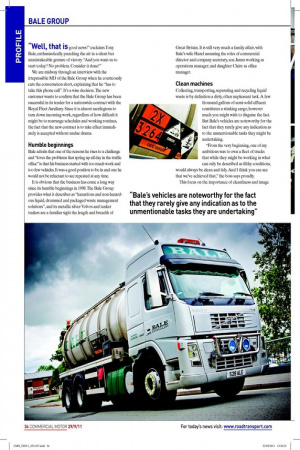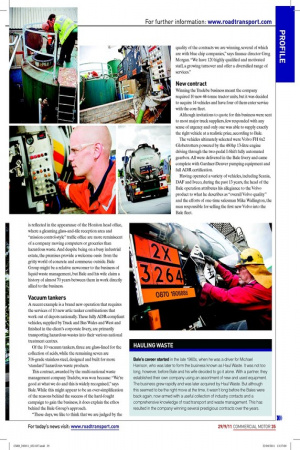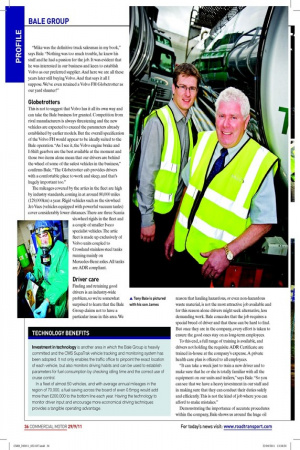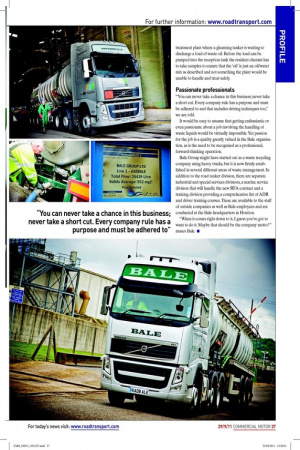“Well, that is good news!” exclaims Tony Bale, enthusiastically punching
Page 33

Page 34

Page 35

Page 36

If you've noticed an error in this article please click here to report it so we can fix it.
the air in a silent but unmistakeable gesture of victory. “And you want us to start today? No problem. Consider it done!”
We are midway through an interview with the irrepressible VID of the Bale Group when he courteously cuts the conversation short, explaining that he “has to take this phone call” . It’s a wise decision. The new customer wants to conirm that the Bale Group has been successful in its tender for a nationwide contract with the Royal Fleet Auxiliary. Since it is almost sacrilegious to turn down incoming work, regardless of how dificult it might be to rearrange schedules and working routines, the fact that the new contract is to take effect immediately is accepted without undue drama.
Humble beginnings
Bale admits that one of the reasons he rises to a challenge and “loves the problems that spring up all day in the trafic ofice” is that his business started with too much work and too few vehicles. It was a good position to be in and one he would not be reluctant to see repeated at any time.
It is obvious that the business has come a long way since its humble beginnings in 1998. The Bale Group provides what it describes as “hazardous and non-hazardous liquid, drummed and packaged waste management solutions” , and its metallic silver Volvos and tanker trailers are a familiar sight the length and breadth of Great Britain. It is still very much a family affair, with Bale’s wife Hazel assuming the roles of commercial director and company secretary, son James working as operations manager, and daughter Claire as ofice manager.
Clean machines
Collecting, transporting, separating and recycling liquid waste is by deinition a dirty, often unpleasant task. A few thousand gallons of semi-solid efluent constitutes a stinking cargo, however much you might wish to disguise the fact. But Bale’s vehicles are noteworthy for the fact that they rarely give any indication as to the unmentionable tasks they might be undertaking.
“From the very beginning, one of my ambitions was to own a leet of trucks that while they might be working in what can only be described as ilthy conditions, would always be clean and tidy. And I think you can see that we’ve achieved that,” the boss says proudly.
This focus on the importance of cleanliness and image is relected in the appearance of the Honiton head ofice, where a gleaming glass-and-tile reception area and “mission control-style” trafic ofice are more reminiscent of a company moving computers or groceries than hazardous waste. And despite being on a busy industrial estate, the premises provide a welcome oasis from the gritty world of concrete and commerce outside. Bale Group might be a relative newcomer to the business of liquid waste management, but Bale and his wife claim a history of almost 70 years between them in work directly allied to the business.
Vacuum tankers
A recent example is a brand new operation that requires the services of 10 new artic tanker combinations that work out of depots nationally. These fully ADR-compliant vehicles, supplied by Truck and Bus Wales and West and inished in the client’s corporate livery, are primarily transporting hazardous wastes into their various national treatment centres.
Of the 10 vacuum tankers, three are glass-lined for the collection of acids, while the remaining seven are 316-grade stainless steel, designed and built for more ‘standard’ hazardous waste products.
This contract, awarded by the multi-national waste management company Tradebe, was won because: “We’re good at what we do and this is widely recognised,” says Bale. While this might appear to be an over-simpliication of the reasons behind the success of the hard-fought campaign to gain the business, it does explain the ethos behind the Bale Group’s approach.
“These days, we like to think that we are judged by the quality of the contracts we are winning, several of which are with blue chip companies,” says inance director Greg Morgan. “We have 120 highly qualiied and motivated staff, a growing turnover and offer a diversiied range of services.”
New contract
Winning the Tradebe business meant the company required 10 new 44-tonne tractor units, but it was decided to acquire 14 vehicles and have four of them enter service with the core leet.
Although invitations to quote for this business were sent to most major truck suppliers, few responded with any sense of urgency and only one was able to supply exactly the right vehicle at a realistic price, according to Bale.
The vehicles ultimately selected were Volvo FH 6x2 Globetrotters powered by the 460hp 13-litre engine driving through the two-pedal I-Shift fully automated gearbox. All were delivered in the Bale livery and came complete with Gardner-Denver pumping equipment and full ADR certiication.
Having operated a variety of vehicles, including Scania, DAF and Iveco, during the past 13 years, the head of the Bale operation attributes his allegiance to the Volvo product to what he describes as “overall Volvo quality” and the efforts of one-time salesman Mike Wallington, the man responsible for selling the irst new Volvo into the Bale leet. “Mike was the deinitive truck salesman in my book,” says Bale. “Nothing was too much trouble, he knew his stuff and he had a passion for the job. It was evident that he was interested in our business and keen to establish Volvo as our preferred supplier. And here we are all these years later still buying Volvo. And that says it all I suppose. We’ve even retained a Volvo FTI Globetrotter as our yard shunter!”
Globetrotters
This is not to suggest that Volvo has it all its own way and can take the Bale business for granted. Competition from rival manufacturers is always threatening and the new vehicles are expected to exceed the parameters already established by earlier models. But the overall speciication of the Volvo FTI would appear to be ideally suited to the Bale operation. “As I see it, the Volvo engine brake and I-Shift gearbox are the best available at the moment and those two items alone mean that our drivers are behind the wheel of some of the safest vehicles in the business,” conirms Bale. “The Globetrotter cab provides drivers with a comfortable place to work and sleep, and that’s hugely important too.” The mileages covered by the artics in the leet are high by industry standards, coming in at around 80,000 miles (129,000km) a year. Rigid vehicles such as the six-wheel Jet-Vacs (vehicles equipped with powerful vacuum tanks) cover considerably lower distances. There are three Scania six-wheel rigids in the leet and a couple of smaller Iveco specialist vehicles. The artic leet is made up exclusively of Volvo units coupled to Crossland stainless steel tanks running mainly on Mercedes-Benz axles. All tanks are ADR compliant.
Driver care
Finding and retaining good drivers is an industry-wide problem, so we’re somewhat surprised to learn that the Bale Group claims not to have a particular issue in this area. We reason that hauling hazardous, or even non-hazardous waste material, is not the most attractive job available and for this reason alone drivers might seek alternative, less demanding work. Bale concedes that the job requires a special breed of driver and that these can be hard to ind. But once they are in the company, every effort is taken to ensure the good ones stay on as long-term employees.
To this end, a full range of training is available, and drivers not holding the requisite ADR Certiicate are trained in-house at the company’s expense. A private health care plan is offered to all employees.
“It can take a week just to train a new driver and to make sure that he or she is totally familiar with all the equipment on our units and trailers,” says Bale. “So you can see that we have a heavy investment in our staff and in making sure that they can conduct their duties safely and eficiently. This is not the kind of job where you can afford to make mistakes.” treatment plant where a gleaming tanker is waiting to discharge a load of waste oil. Before the load can be pumped into the reception tank the resident chemist has to take samples to ensure that the ‘oil’ is just an oil/water mix as described and not something the plant would be unable to handle and treat safely.
Passionate professionals
“You can never take a chance in this business; never take a short cut. Every company rule has a purpose and must be adhered to and that includes driving techniques too,” we are told.
It would be easy to assume that getting enthusiastic or even passionate about a job involving the handling of waste liquids would be virtually impossible. Yet passion for the job is a quality greatly valued in the Bale organisation, as is the need to be recognised as a professional, forward-thinking operation.
Bale Group might have started out as a waste recycling company using heavy trucks, but it is now irmly established in several different areas of waste management. In addition to the road tanker division, there are separate industrial and special services divisions, a marine service division that will handle the new RFA contract and a training division providing a comprehensive list of ADR and driver training courses. These are available to the staff of outside companies as well as Bale employees and are conducted at the Bale headquarters in Honiton.
“When it comes right down to it, I guess you’ve got to want to do it. Maybe that should be the company motto?” muses Bale. ■
Demonstrating the importance of accurate procedures within the company, Bale shows us around the huge oil


















































